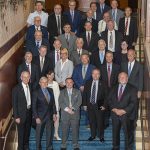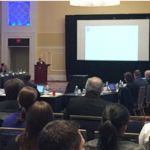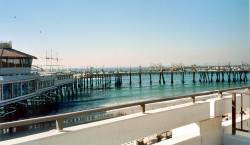
The National Space-Based Positioning, Navigation, and Timing (PNT) Advisory Board will meet next week, where the issue of interference to GPS from LightSquared’s terrestrial wireless broadband transmitters will get another airing.
The National Space-Based Positioning, Navigation, and Timing (PNT) Advisory Board will meet next week, where the issue of interference to GPS from LightSquared’s terrestrial wireless broadband transmitters will get another airing.
According to the Civil GPS Service Interface Committee (CGSIC) announcement of the meeting, the advisory board expects to have a panel that includes LightSquared Executive Vice-President of Ecosystem Development and Satellite Business Martin Harriman and Javad Ashjaee, CEO of JAVAD GNSS, who will discuss proposed GPS receiver filter solutions as well as the latest test results. The Federal Communications Commission (FCC) approved a conditional waiver on January 26, 2011, allowing LightSquared Subsidiary LLC to build tens of thousands of terrestrial transmitters for wireless communications in frequencies on either side of the GPS L1 band.
The discussion may draw particular attention because the advisory board’s vice-chair, Brad Parkinson, has been the subject of recent criticism from both LightSquared officials and Ashjaee.
In a statement issued on Thursday (October 27, 2011), Jeff Carlisle, LightSquared’s executive vice-president for regulatory affairs and public policy, accused Parkinson — whose role on the advisory board he misidentified — of a conflict of interest on the subject of GPS and LightSquared. Parkinson was the founder of the GPS Joint Program Office in the 1970s, is a long-standing member of the GPS Independent Review Team, and sits on Trimble’s board of directors.
In his statement, Carlisle said, “SEC filings show that PNT Chair Brad Parkinson sold $1.5 million worth of his Trimble stock within weeks of the FCC granting the waiver to LightSquared. . . . In sum, board members sold nearly $20 million worth of stock within three weeks of LightSquared being granted the FCC waiver — three times the highest amount of stock board members and top managers had unloaded in any one month going back to at least January 2007.”
The LightSquared vice-president argued that the stock sales “demonstrated that Trimble insiders clearly viewed LightSquared as a financial threat to its commercial business.”
“Clearly, Dr. Parkinson cannot objectively advise the Pentagon or any other government agency if he is obligated as a Trimble board member to protect the fiduciary interests of the company’s shareholders,” Carlisle concluded.
Arguably, a more likely reason for the sales of Trimble shares by company officials was that stock prices were reaching all-time highs during the period Carlisle cited, eventually moving above $50 per share.
Indeed, according to share price history on the NASDAQ exchange where Trimble stock is listed, the only significant drop in prices occurred after the company’s release of quarterly results on April 28. Until then and throughout the period after the FCC announced its plans for LightSquared beginning in November 2010, Trimble share prices had risen steadily.
As for Ashjaee, in a statement recently posted on his company’s website, he claims that Parkinson did not understand his filter solution for LightSquared’s interference, which he says compensates for group and carrier delay variations of filters, producing a flat filter group delay.
In September, JAVAD GNSS announced a series of enhancements that the company says will enable high-precision GNSS receivers to operate in the presence of LightSquared L1 terrestrial wireless-broadband transmissions. On September 21, LightSquared announced an agreement with Ashjaee’s company to develop the technology.
Referring to a hearing on the subject of LightSquared and GPS held by the National Telecommunications and Information Administration (NTIA) on August 26, Javad wrote, “[A]t the NTIA conference when I heard Parkinson’s focus on group delay variations of filters and his claim that a filter to protect GPS and have flat group delay does not exist, I realized that . . . he had not really understood what I had explained to him.”
He also criticized Parkinson and PNT advisory board chairman James Schlesinger for writing an August 3 letter to FCC Chairman Julius Genachowski that strongly recommended the FCC rescind its conditional waiver for LightSquared operation near GPS. Instead, Schlesinger and Parkinson wrote, the agency should find another frequency band “well away from GPS that allows LightSquared to compete with the other broadband suppliers and does not jeopardize US infrastructure, imposing unnecessary costs to the many millions of current GPS users.”
Ashjaee concluded, “It is unfortunate that Prof. Parkinson was able to entice Hon. Schlesinger to coauthor the letter that was sent to FCC Chairman Genachowski,” adding that, “False claims and advice even misled the honorable General [William] Shelton [commander of U.S. Air Force Space Command] to deliver wrong testimony to Congress.
Other topics on the PNT Advisory Board agenda include:
· future challenges to PNT service providers and users, such as protecting the emerging role of PNT in cyber networks, including the need for back-ups.
· opportunities for enhancing the interoperability of GPS with other emerging international Global Navigation Satellite System constellation services.
· a review of GPS Standard Positioning Service Performance Standards and effects on “non-ICD compliant” receivers in the marketplace.
The meeting is scheduled for Wednesday, (November 9, 2011) 9 a.m. to 5 p.m., and Thursday (November 10,2011) 9 a.m. to 1 p.m. in the Washington Ballroom of the Crowne Plaza Old Town Alexandria Hotel, 901 North Fairfax, Alexandria, Virginia.
For further information, contact: James J. Miller, Human Exploration and Operations Mission Directorate, National Aeronautics and Space Administration, Washington, DC 20546, (202) 358-4417. The meeting will be open to the public up to the seating capacity of the room.






